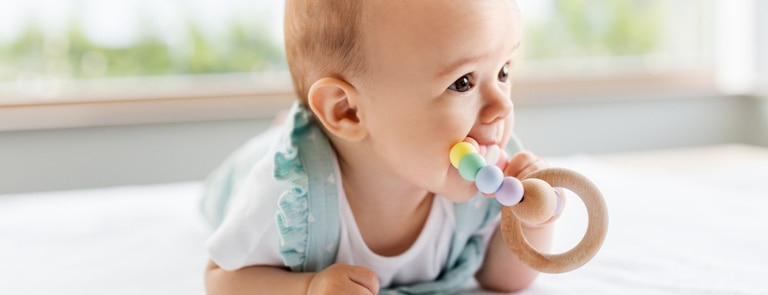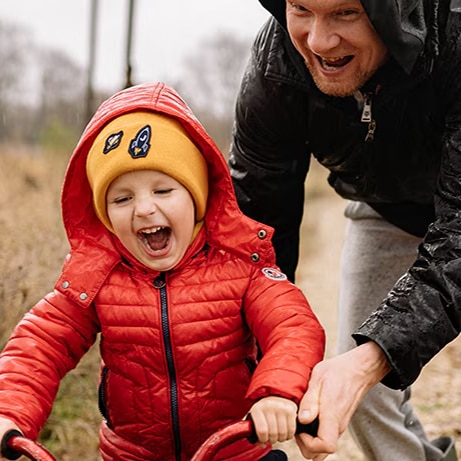15% off £25 or 20% off £35
Code:BASKET
How much sleep do children need?

We spoke to a paediatric sleep consultant to get the lowdown on everything you need to know about sleep for you kids, including expert tips to get them into a routine
Summary
1How much sleep do children need?
The amount of sleep children need changes as they grow. Sleep guidelines are always a helpful starting point, but it’s good to...
2The importance of sleep for children
From supporting emotional well-being to helping support their immune system, sleep is vital in nearly every aspect of...
37 top tips from a sleep expert
Before you start laying down the law with bedtime routines, it’s important to make sure all caregivers are on the same page...
Between school holidays, late-night screen time and a few too many sugary snacks, there’s a lot that can throw kids’ sleep routines off course.
Having coached hundreds of families through sleepless nights, she shares her tried-and-tested tips for resetting your child’s routine.
In fact, research from the British Nutrition Foundation reveals that a third of primary school children and 70% of secondary school students aren’t getting the recommended nine hours of sleep per night, falling short of NHS advice1 for their age groups.
But if your child’s bedtime has recently slipped and mornings have recently become a struggle, rest assured, there’s plenty you can do to get things back on track.
“When kids are well-rested, they tend to be happier, more engaged and much better able to concentrate,” explains paediatric sleep expert Rachael Wilson.
Having coached hundreds of families through sleepless nights, she shares her tried-and-tested tips for resetting your child’s routine.
How much sleep do children need?
The amount of sleep children need changes as they grow. As a guide, the NHS1 and Sleep Foundation2 recommend as follows:
- babies (aged 4 to 12 months): 12 to 16 hours in a 24-hour period (including naps)
- toddlers (1 to 2 years): 11 to 14 hours (including naps)
- preschoolers (3 to 5 years): 10 to 13 hours
- school-age children (6 to 12 years): 9 to 12 hours
- teenagers (13 to 18 years): 8 to 10 hours
“Sleep guidelines are always a helpful starting point, but it’s good to remember that every child is different,” explains Rachael.
“Parents often worry if their child’s sleep doesn’t match what they’ve read online, but some kids simply need less than others in their peer group, and it may be that they’ve just used up all their ‘sleep tickets’, as I like to call them, for the day.”
The importance of sleep for children
From supporting emotional wellbeing to helping support their immune system, sleep is vital in nearly every aspect of children’s growth.3
“Sleep is amazing for brain development,” says Rachael.3 “Children are a bit like little sponges who are constantly learning. And just like adults, when they’re overtired, they don’t function at their best.”
That’s especially true during the first half of the night, from bedtime until around midnight or 1am, when deep sleep is at its peak.4 “This is when the brain gets busy sorting and storing memories, so that deep sleep window5 is crucial for their learning,” explains Rachael.
It’s not just brains that benefit from rest either, as growing bodies need quality kip too. “The pituitary gland releases growth hormone6 during deep sleep,” says Rachael, which is the hormone responsible for physical development like height, bone length and muscle growth.6

“If a child regularly goes to bed very late, they may be missing out on that essential growth7 process.”
Finally, lack of sleep has a big impact on mood.10 “Think meltdowns, tantrums and sugar cravings,” says Rachael. “But when kids are well-rested, they tend to be happier, more engaged and much better able to concentrate.”
How to reset kids’ sleep routines: 7 top tips from a sleep expert
- Get everyone on the same page
Before you start laying down the law with bedtime routines, it’s important to make sure all caregivers are on the same page.
“If one parent is sticking to a routine while the other is winging it, children will quickly pick up on the inconsistency, and sleep can become chaotic,” says Rachael. - Follow the 80/20 routine
When you’re setting a new bedtime standard, it’s easy to feel guilty if unexpected plans keep the whole family out later than you’d like.
“Rigid routines 24/7 aren’t realistic for everyone, so I recommend sticking to the 80/20 rule – sticking to your bedtime structure 80% of the time, which is roughly five nights a week,” says Rachael. “The other two can be more flexible, to fit around dinners out, late pickups or just life.” - Use picture cards
From around age two, toddlers thrive with boundaries.11 “Knowing what’s coming next helps them to feel safe and secure, but they’re more likely to respond to visual cues than audio instructions,” says Rachael.12
“Routine charts, using images or cards, can be a powerful tool for this age group, helping them understand and take part in their own wind-down,” she adds.
For example, you could have a picture of bathtime, followed by a bottle and a book in bed. “By following the picture, little ones feel in control, but you’re still steering the ship,” says Rachael. - Keep bedtimes calm
Although it’s tempting to keep kids laughing and joking, bedtime isn’t the moment for games, hyperactivity or rough-and-tumble play.
“Dim the lights, keep things quiet and skip screens like TVs, tablets and even smart watches for at least 90 minutes before bed,” says Rachael.
“A bath 30 to 40 minutes before can also help to bring on sleepy sensations, as it raises and drops the core body temperature, signalling to the brain that it’s time to wind down.”13 - Think nutritionally
What children eat during the day can affect how well they sleep at night.
“While store bought pouches are convenient, they won’t give your children the nutrients they need for good sleep,” says Rachael. “Try loading their plates with lots of green leafy vegetables, as nutrition is always important for kids.” - Try bathtime toast
If your toddler is eating an early dinner at nursery, Rachael says they might wake up in the early hours because they’re hungry.
Her effective solution? “Serve a nutritious snack like avocado or banana on toast in the bath.
“Giving kids a snack in the bath means they won’t get sticky and dirty again, and it can be a good negotiation tactic to get fussy kids to wash.”
The final say
When children regularly wake up cranky and overtired, it’s easy for parents to feel powerless to break the cycle. But with a few expert-approved tips and tools in your pocket, you can gently guide them towards a better, more restful night’s sleep.
Struggling with your own sleep? It could be something to do with your circadian rhythm…
This article provides informational advice and is not a substitute for medical care. Curated by experts for accuracy, we take great care to ensure the information is up-to-date and relevant. However, you should always consult your GP or healthcare professional before using supplements or alternative products, particularly if you have medical conditions or are under supervision.
1. NHS. Sleep [Internet]. cambspborochildrenshealth.nhs.uk. 2024. Available from: https://cambspborochildrenshealth.nhs.uk/sleep/
2. Suni E, Vyas N. How Much Sleep Do Babies and Kids Need? [Internet]. Sleep Foundation. 2020. Available from: https://www.sleepfoundation.org/children-and-sleep/how-much-sleep-do-kids-need
3. Children’s sleep linked to brain development [Internet]. National Institutes of Health (NIH). 2025 [cited 2025 Jun 5]. Available from: https://www.nih.gov/news-events/nih-research-matters/childrens-sleep-linked-brain-development
4. Brinkman JE, Sharma S, Reddy V. Physiology of Sleep [Internet]. PubMed. Treasure Island (FL): StatPearls Publishing; 2023. Available from: https://www.ncbi.nlm.nih.gov/books/NBK482512/
5. Gómez RL, Edgin JO. Sleep as a Window Into Early Neural Development: Shifts in Sleep-Dependent Learning Effects Across Early Childhood. Child Development Perspectives. 2015 Jun 20;9(3):183–9.
6. Zaffanello M, Pietrobelli A, Cavarzere P, Guzzo A, Antoniazzi F. Complex relationship between growth hormone and sleep in children: insights, discrepancies, and implications. Frontiers in Endocrinology [Internet]. 2023;14:1332114. Available from: https://pubmed.ncbi.nlm.nih.gov/38327902/#:~:text=GHD%20appears%20to%20have%20an
7. Wang SH, Lin KL, Chen CL, Chiou H, Chang CJ, Chen PH, et al. Sleep problems during early and late infancy: Diverse impacts on child development trajectories across multiple domains. Sleep Medicine [Internet]. 2024 Mar 1;115:177–86. Available from: https://www.sciencedirect.com/science/article/pii/S1389945724000595?via%3Dihub
8. Cohen S, Doyle WJ, Alper CM, Janicki-Deverts D, Turner RB. Sleep Habits and Susceptibility to the Common Cold. Archives of Internal Medicine. 2009 Jan 12;169(1):62.
9. Brinkman JE, Sharma S, Reddy V. Physiology of Sleep [Internet]. PubMed. Treasure Island (FL): StatPearls Publishing; 2023. Available from: https://www.ncbi.nlm.nih.gov/books/NBK482512/
10. Asarnow LD, Mirchandaney R. Sleep and Mood Disorders Among Youth. Child and Adolescent Psychiatric Clinics of North America. 2020 Oct;30(1).
11. Lanjekar PD, Joshi SH, Lanjekar PD, Wagh V. The effect of parenting and the parent-child relationship on a child’s cognitive development: A literature review. Cureus [Internet]. 2022 Oct 22;14(10):1–7. Available from: https://www.cureus.com/articles/114808-the-effect-of-parenting-and-the-parent-child-relationship-on-a-childs-cognitive-development-a-literature-review
12. Swider-Cios E, Vermeij A, Sitskoorn MM. Young children and screen-based media: The impact on cognitive and socioemotional development and the importance of parental mediation. Cognitive Development [Internet]. 2023;66(66):101319. Available from: https://www.sciencedirect.com/science/article/pii/S0885201423000242
13. News: A Warm Bedtime Bath Can Help You Cool... (NPR News) - Behind the headlines - NLM [Internet]. NCBI. Available from: https://www.ncbi.nlm.nih.gov/search/research-news/3495/












